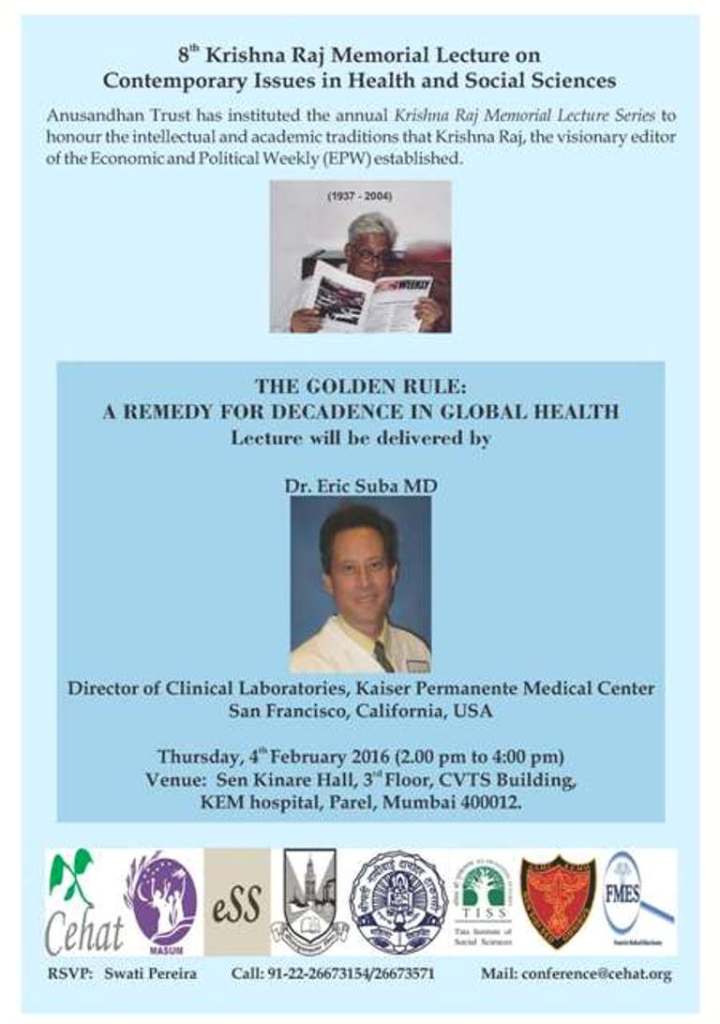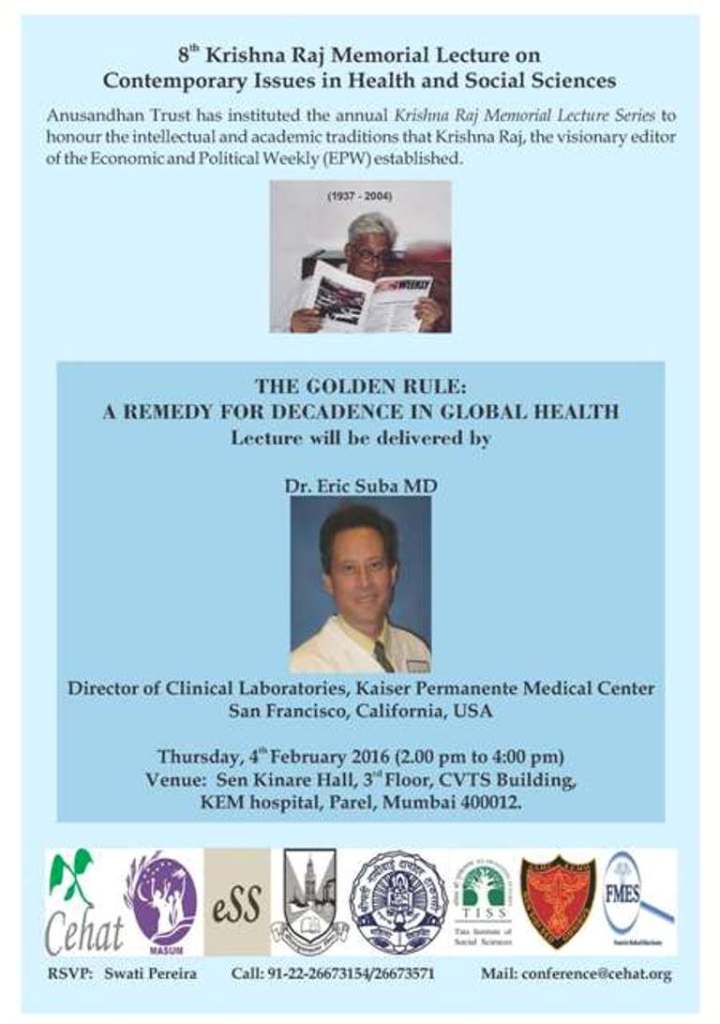CEHAT is running a 24*7 helpline to respond to women and girls facing violence .Please call this number 9029073154 for support and assistance.

Author(s): Suba, Eric
|Published Year: 2016
The Eighth Krishna Raj Memorial Lecture On Contemporary Issues in Health and Social Sciences ‘The Golden Rule: a remedy for decadence in global health’ By Dr. Eric Suba
Industry-sponsored drug trials have often come under public scrutiny for unethical practices. Much less attention has been paid to similar concerns in public health research.
The ethics of international public health research will be discussed at The Eighth Krishna Raj Memorial Lecture.
Dr Eric Suba will speak on cancer screening trials conducted on more than 300,000 women in the slums of Mumbai and villages in Maharashtra and Tamil Nadu. The trials were funded by the US National Institutes of Health and the Bill and Melinda Gates Foundation.
Dr Suba is pathologist and director of clinical laboratories at the Kaiser Permanante Medical Center, San Francisco, CA, USA and also leads the Viet/American Cervical Cancer Prevention Project, a non-profit organisation. He is currently Visiting Scholar at the National Center for Bioethics at Tuskegee University, Tuskegee, Alabama, USA.
The Krishna Raj Memorial Lecture on Contemporary Issues in Health and Social Sciences was instituted by the Anusandhan Trust to honour the intellectual and academic traditions set in place by the visionary editor of the Economic and Political Weekly.
Venue: Sen Kinare Hall, CVTS Building, Opp. to KEM College Main Building KEM Hospital, Parel, Mumbai, Date: Thursday, February 4, 2016
Time: 2-4 pm
Organised by: CEHAT, MASUM, eSocial Sciences, University of Mumbai, SNDT Women’s University, Tata Institute of Social Sciences, Seth GS Medical College and KEM Hospital, Forum for Medical Ethics Society.
Summary of trials of a cheap cancer screening method
Between 1998 and 2013, researchers in India conducted randomised controlled trials* of a cheap cervical cancer screening method on over 300,000 women from slums in Mumbai and villages in Maharashtra (Osmanabad) and Tamil Nadu (Dindugul).
The screening method tested was visual inspection of the cervix after it is stained with acetic acid (VIA) to identify pre-cancerous lesions so that they can be treated before they progress to cervical cancer. Women testing positive were either treated using a pre-defined protocol (details different in each trial) or referred to a hospital for follow-up and treatment.
All three trials had ‘no screening’ control arms – totalling over 140,000 women – who were given ‘health education’ on the importance of screening. These women were deprived of established screening methods. The researchers sought to test if VIA could really work in a programme in terms of how many women died because they were NOT given care. At least 254 women in the ‘no screening’ control arms died.
These trials involved top national and international medical researchers and institutions and were funded by the US government’s National Cancer Institute and the Bill and Melinda Gates Foundation.
The use of a ‘no screening’ arm when an effective test exists was contrary to national and international ethical guidelines for research. Pap smear, the gold standard for cervical cancer screening, is available at tertiary centres all over India.
The women in these trials were not given complete information – or they would not have taken part in these trials. Available informed consent forms contain false statements and withhold critical information.
These are the only known cervical cancer screening studies, anywhere in the world, with mortality endpoints. Researchers observed while women who were not screened for cervical cancer developed the cancer and died.
Links to comments on these trials – and the researchers’ responses:
IJME 2013 July http://ijme.in/index.php/ijme/article/view/18/813
IJME 2013 Oct http://ijme.in/index.php/ijme/article/view/569/4500
IJME 2013 Oct http://ijme.in/index.php/ijme/article/view/568/1455
IJME 2013 Oct http://ijme.in/index.php/ijme/article/view/570/1459
IJME 2014 July http://ijme.in/index.php/ijme/article/view/2072/4511
IJME 2014 July http://ijme.in/index.php/ijme/article/view/2094/4516
*A randomised controlled trial compares one or more interventions (new drugs, tests) to a ‘control’ which is usually another intervention (proven effective drug, test). Participants are assigned to one or the other group (or ‘arm’) at random to see which drug gets people better faster, with fewer complications, or which test identifies a health problem with more accuracy. In a randomised placebo controlled trial, the intervention is tested against an inactive substance or ‘sugar pill’. If the intervention is a screening test, the placebo control is called the ‘no screening’ control.


8th Krishna Raj Memorial Lecture video on YouTube.

CEHAT is running a 24*7 helpline to respond to women and girls facing violence .Please call this number 9029073154 for support and assistance.